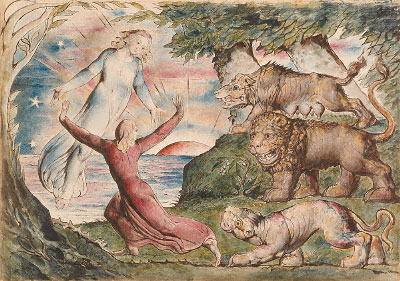 |
Dante Running from the Three Beasts 1824-27 pen, ink and watercolour over pencil (NGV 3) Felton Bequest, 1920 988-3 National Gallery of Victoria |
From Fromhttp://en.wikipedia.org/wiki/Virgil
Publius Vergilius Maro (Classical Latin: [ˈpuː.blɪ.ʊs wɛrˈgɪ.lɪ.ʊs ˈma.roː]; October 15, 70 BC – September 21, 19 BC), usually called Virgil or Vergil /ˈvɜrdʒɨl/ in English, was an ancient Roman poet of the Augustan period. He is known for three major works of Latin literature, the Eclogues (orBucolics), the Georgics, and the epic Aeneid. A number of minor poems, collected in the Appendix Vergiliana, are sometimes attributed to him.
Virgil is traditionally ranked as one of Rome's greatest poets. His Aeneid has been considered thenational epic of ancient Rome from the time of its composition to the present day. Modeled afterHomer's Iliad and Odyssey, the Aeneid follows the Trojan refugee Aeneas as he struggles to fulfill his destiny and arrive on the shores of Italy—in Roman mythology the founding act of Rome. Virgil's work has had wide and deep influence on Western literature, most notably Dante's Divine Comedy, in which Virgil appears as Dante's guide through hell and purgatory.
No comments:
Post a Comment